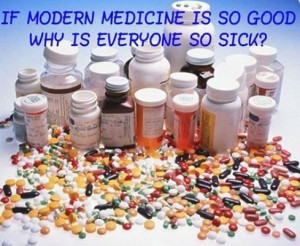‘If you push the understanding of the physiological basis of medicine far enough, you’ll come to a point where you can no longer defend it scientifically, that you must take it on faith.’
Dr Mehmet Oz
Few people realise how new drugs are ‘invented’. Many come about by accident by trial and error. Many are discovered by accident. A good example is Viagra. Viagra was invented for angina, a heart condition. In tests, researchers noticed a strange side effect. Marketing people quickly realised they had a saleable product on their hands, completely unrelated to its original purpose!
The effects of drugs are not selective. Often the makers don’t know what a drug will do until they trial it. Side effects often come to notice only when a drug is launched onto the market (e.g. thalidomide).
The truth is, there is no such thing as a totally safe medicine, or one we know everything about. By their very nature they are designed to interrupt and change a biological process. The question is – what risks are we willing to take?
Drugs are mass produced. They take little account of individual differences. No-one knows precisely what a drug will do to an individual until they take it. Sometimes (e.g. Viagra) the effects are completely unexpected.
Shortcomings of drugs
The Hippocratic Oath compels doctors to do no harm. If this were taken seriously, how many pharmaceutical medicines could be prescribed? A few? Ore the majority? Many drugs are unpredictable and highly toxic. What if every doctor knew of alternatives which work just as well or better?
Actually, most doctors are aware of their shortcomings. One said that the only difference between most drugs and poisons is the dose. Their shortcomings include:
- Affordability – many people in the world’s richest countries can’t afford them; many poorer countries can’t afford them either. Some, like Hungary, are funding research into alternatives because they cannot afford them and don’t want to be held hostage by the multinational drug companies.
- Tolerance – with any drug, you build up tolerance. The more you take, the more you need to get the same effect.
- Side effects – read the information leaflet that comes with any prescribed drug, and you will see a long (and sometime shocking) list of its possible side effects. E.g. Paroxetine, a SSRI, has been blamed for causing chronic hepatitis, seizures, suicidal tendencies and abnormal bleeding. Thalidomide (its dramatic effects when first prescribed half a century ago are well-known). Seroxat is estimated to raise the suicide rate by a factor of eight among those who take it, and for this reason is no longer prescribed in several countries including the UK. Indeed, between 2002 and 2010, eight drugs were withdrawn in the UK due to harmful side effects, including Seroxat, Vioxx, Ribonaband and Celebrex. Sometimes the authorities show a marked reluctance to take a product off the market even after it has been suspected of being dangerous. For example, a drug claimed to relieve diabetes, Avandia, was still on the market three years after it was shown to kill 19% of those who took it![1]
- Addiction – there is no difference in effect between addiction to illegal drugs like heroin or cocaine and addiction to prescribed drugs such as painkillers. The only difference is that the latter are easily available from any pharmacist over the counter. One – codeine – is an opiate, coming from the same family as heroin!
- Suppressing ST symptoms using drugs can cause LT illness. Symptoms have a purpose – to bring our attention to a deeper problem.
- Drugs can distort diagnoses. When a drug comes out to address a particular condition, suddenly many more people come forward claiming to have that condition.
Pharmacological drugs do have a role to play. Sometimes they are all we have, and sometimes they offer a quality of life that would be impossible to some without them (e.g. many sufferers of serious mental illnesses like schizophrenia and bi-polar disorder).
BUT RATHER THAN CONSIDERING THEM THE NORM, SHOULDN’T WE BE LOOKING FOR ALTERNATIVES AS A FIRST RESPONSE?
©David Lawrence Preston, 18.5.2016
Follow me on Facebook and Twitter @Feelinggoodatt
Visit www.feelinggoodallthetime.com
[1] Source: What Doctors Don’t Tell You, e-bulletin, 2nd March 2010, www.wddty.com


Leave a Reply